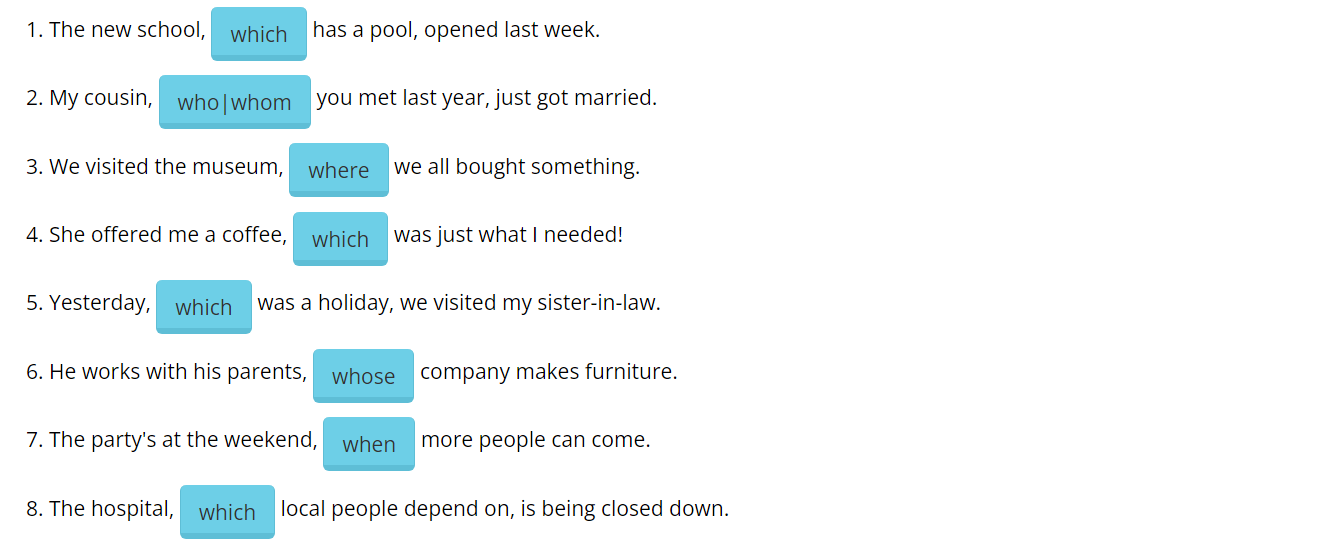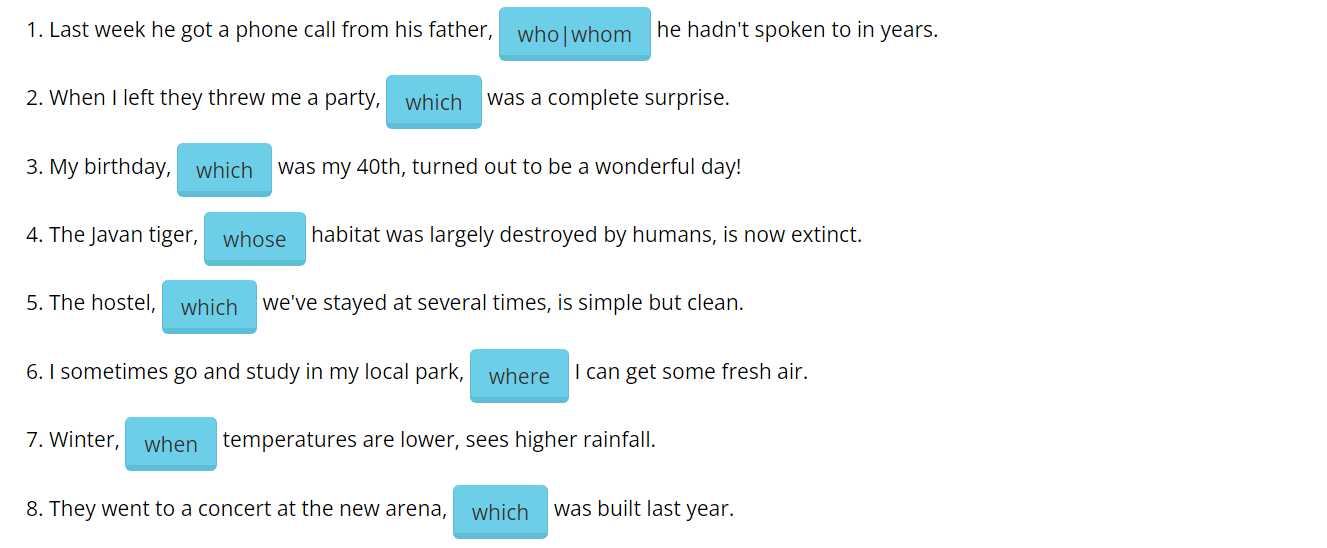【B1-B2-Grammar】26 Relative clauses,non-defining relative clauses-关系从句,非限定性关系从句
【B1-B2-Grammar】26 Relative clauses,non-defining relative clauses-关系从句,非限定性关系从句

Do you know how to give extra information about someone or something using relative clauses? Test what you know with interactive exercises and read the explanation to help you. 您知道如何使用关系从句提供有关某人或某事的额外信息吗? 通过互动练习测试您所掌握的知识,并阅读说明来帮助您。
Look at these examples to see how non-defining relative clauses are used.查看这些示例,了解如何使用非定义关系从句。
Jack, who’s retired now, spends a lot of time with his grandchildren. 杰克现在已经退休了,他花了很多时间陪伴他的孙子们。
We want to see the new Tom Carter film, which was released on Friday. 我们想看周五上映的汤姆·卡特新电影。
My sister, whose dog I’m looking after, is visiting a friend in Australia. 我照顾我姐姐的狗,她正在澳大利亚拜访一位朋友。
Try this exercise to test your grammar.尝试这个练习来测试你的语法。
Grammar test 1-语法测试1
Relative clauses – non-defining relative clauses: 1
Complete the sentences with ‘who’, ‘which’, ‘whose’, ‘when’ or ‘where’.
- Question
- The new school, ___ has a pool, opened last week.
- My cousin, ___ you met last year, just got married.
- We visited the museum, ___ we all bought something.
- She offered me a coffee, ___ was just what I needed!
- Yesterday, ___ was a holiday, we visited my sister-in-law.
- He works with his parents, ___ company makes furniture.
- The party’s at the weekend, ___ more people can come.
- The hospital, ___ local people depend on, is being closed down.
- Answer
- The new school, which has a pool, opened last week.
- My cousin, who|whom you met last year, just got married.
- We visited the museum, where we all bought something.
- She offered me a coffee, which was just what I needed!
- Yesterday, which was a holiday, we visited my sister-in-law.
- He works with his parents, whose company makes furniture.
- The party’s at the weekend, when more people can come.
- The hospital, which local people depend on, is being closed down.

题目1:
The new school, ___ has a pool, opened last week.
这所新学校有一个游泳池,上周开学了。选项:
- which: 用于指物,可以表示“哪个”。
解释:因为指的是学校(物),所以用“which”。
正确答案:which
翻译:这所新学校有一个游泳池,上周开学了。
题目2:
My cousin, ___ you met last year, just got married.
我的堂兄/表兄,你去年见过的,刚刚结婚了。选项:
- who: 用于指人,可以表示“谁”或“那个人”。
解释:因为指的是人(堂兄/表兄),所以用“who”。
正确答案:who
翻译:我的堂兄/表兄,你去年见过的,刚刚结婚了。
题目3:
We visited the museum, ___ we all bought something.
我们参观了博物馆,我们都买了一些东西。选项:
- where: 用于指地点,表示“哪里”。
解释:因为指的是地点(博物馆),所以用“where”。
正确答案:where
翻译:我们参观了博物馆,我们都买了一些东西。
题目4:
She offered me a coffee, ___ was just what I needed!
她请我喝了一杯咖啡,正是我需要的!选项:
- which: 用于指物,可以表示“哪个”。
解释:因为指的是物(咖啡),所以用“which”。
正确答案:which
翻译:她请我喝了一杯咖啡,正是我需要的!
题目5:
Yesterday, ___ was a holiday, we visited my sister-in-law.
昨天是个假日,我们去看了我嫂子/弟媳。选项:
- which: 用于指物,可以表示“哪个”。
- when: 用于指时间,表示“什么时候”。
解释:因为指的哪个,所以用“which”。
正确答案:which
翻译:昨天是个假日,我们去看了我嫂子/弟媳。
题目6:
He works with his parents, ___ company makes furniture.
他和他的父母一起工作,他们的公司生产家具。选项:
- whose: 用于表示所属关系,表示“谁的”。
解释:因为需要表示所属关系(公司是他父母的),所以用“whose”。
正确答案:whose
翻译:他和他的父母一起工作,他们的公司生产家具。
题目7:
The party’s at the weekend, ___ more people can come.
聚会在周末,更多的人可以来。选项:
- when: 用于指时间,表示“什么时候”。
解释:因为指的是时间(周末),所以用“when”。
正确答案:when
翻译:聚会在周末,更多的人可以来。
题目8:
The hospital, ___ local people depend on, is being closed down.
当地人依赖的那家医院正在关闭。选项:
- which: 用于指物,可以表示“哪个”。
解释:因为指的是物(医院),所以用“which”。
正确答案:which
翻译:当地人依赖的那家医院正在关闭。
Read the explanation to learn more.阅读说明以了解更多信息。
Grammar explanation-语法解释
Relative clauses give us information about the person or thing mentioned. 关系从句为我们提供有关所提到的人或事物的信息。
Non-defining relative clauses give us extra information about someone or something. It isn’t essential for understanding who or what we are talking about. 非限定关系从句为我们提供有关某人或某事的额外信息。这对于理解我们在谈论谁或谈论什么并不重要。
My grandfather,* who’s 87, goes swimming every day.* 我 87 岁的祖父每天都去游泳。
The house, which was built in 1883,* has just been opened to the public.* 这所房子建于1883年,刚刚向公众开放。
The award was given to Sara, whose short story impressed the judges. 该奖项授予萨拉,她的短篇小说给评委留下了深刻的印象。
We always use a relative pronoun or adverb to start a non-defining relative clause: who, which, whose, when or where (but not that). We also use commas to separate the clause from the rest of the sentence. 我们总是使用关系代词或副词来启动非限定性关系从句:who、which、whose、when 或 where(但不是 that)。我们还使用逗号将子句与句子的其余部分分隔开。
who, which and whose-谁,哪个和谁的
We can use who to talk about people, which to talk about things and whose to refer to the person or thing that something belongs to. 我们可以使用 who 来谈论人,which 来谈论事物,以及 who 来指代某事物所属的人或事物。
Yesterday I met my new boss, who was very nice. 昨天我见到了我的新老板,他非常友善。
The house, which is very big, is also very cold! 房子很大,也很冷!
My next-door neighbour, whose children go to school with ours, has just bought a new car. 我的隔壁邻居刚刚买了一辆新车,他的孩子和我们的孩子一起上学。
After the port there is a row of fishermen’s houses, whose lights can be seen from across the bay. 港口后面有一排渔民的房屋,从海湾对面就能看到渔民的灯光。
Places and times-地点和时间
We can use which with a preposition to talk about places and times. In these cases it’s more common to use where or when instead of which and the preposition. 我们可以将which与介词一起使用来谈论地点和时间。在这些情况下,更常见的是使用where或when而不是which和介词。
City Park, which we used to go to, has been closed down. 我们以前常去的城市公园已经关闭了。
City Park, where we used to go, has been closed down. 我们以前常去的城市公园已经关闭了。
December, which Christmas is celebrated in, is a summer month for the southern hemisphere. 庆祝圣诞节的十二月是南半球的夏季月份。
December, when Christmas is celebrated, is a summer month for the southern hemisphere. 十二月是南半球的夏季月份,庆祝圣诞节。
However, when we use which without a preposition, we can’t use where or when. 然而,当我们使用没有介词的which时,我们不能使用where或when。
Centre Park, which we love, is always really busy on Saturdays. 我们喜爱的中心公园在周六总是非常繁忙。
February, which is my favourite month, lasts 29 days this year. 二月是我最喜欢的月份,今年有 29 天。*
Do this exercise to test your grammar again. 做这个练习来再次测试你的语法。
Grammar test 2-语法测试2
Relative clauses – non-defining relative clauses: 2
Complete the sentences with ‘who’, ‘which’, ‘whose’, ‘when’ or ‘where’.
- Question
- Last week he got a phone call from his father, __ he hadn’t spoken to in years.
- When I left they threw me a party, __ was a complete surprise.
- My birthday, __ was my 40th, turned out to be a wonderful day!
- The Javan tiger, __ habitat was largely destroyed by humans, is now extinct.
- The hostel, __ we’ve stayed at several times, is simple but clean.
- I sometimes go and study in my local park, __ I can get some fresh air.
- Winter, __ temperatures are lower, sees higher rainfall.
- They went to a concert at the new arena, __ was built last year.
- Answer
- Last week he got a phone call from his father, who he hadn’t spoken to in years.
- When I left they threw me a party, which was a complete surprise.
- My birthday, which was my 40th, turned out to be a wonderful day!
- The Javan tiger, whose habitat was largely destroyed by humans, is now extinct.
- The hostel, which we’ve stayed at several times, is simple but clean.
- I sometimes go and study in my local park, where I can get some fresh air.
- Winter, when temperatures are lower, sees higher rainfall.
- They went to a concert at the new arena, which was built last year.

题目1:
Last week he got a phone call from his father, __ he hadn’t spoken to in years.
上周他接到了他父亲的电话,他已经多年没有和他说话了。选项:
- who: 用于指人,可以表示“谁”或“那个人”。
解释:因为指的是人(父亲),所以用“who”。
正确答案:who
翻译:上周他接到了他父亲的电话,他已经多年没有和他说话了。
题目2:
When I left they threw me a party, __ was a complete surprise.
我离开的时候他们为我举办了一个派对,这完全是个惊喜。选项:
- which: 用于指物,可以表示“哪个”。
解释:因为指的是物(派对),所以用“which”。
正确答案:which
翻译:我离开的时候他们为我举办了一个派对,这完全是个惊喜。
题目3:
My birthday, __ was my 40th, turned out to be a wonderful day!
我的生日,我的四十大寿,结果是美好的一天!选项:
- which: 用于指物,可以表示“哪个”。
解释:因为指的是事件(生日),所以用“which”。
正确答案:which
翻译:我的生日,我的四十大寿,结果是美好的一天!
题目4:
The Javan tiger, __ habitat was largely destroyed by humans, is now extinct.
爪哇虎,它的栖息地大部分被人类破坏了,现在已经灭绝了。选项:
- whose: 用于表示所属关系,表示“谁的”。
解释:因为需要表示所属关系(栖息地是爪哇虎的),所以用“whose”。
正确答案:whose
翻译:爪哇虎,它的栖息地大部分被人类破坏了,现在已经灭绝了。
题目5:
The hostel, __ we’ve stayed at several times, is simple but clean.
我们住过几次的那家旅社,虽然简单但很干净。选项:
- where: 用于指地点,表示“哪里”。
- which: 用于指物,可以表示“哪个”。
解释:因为指的是哪个(旅社),所以用“which”。
正确答案:which
翻译:我们住过几次的那家旅社,虽然简单但很干净。
题目6:
I sometimes go and study in my local park, __ I can get some fresh air.
我有时去当地的公园学习,在那里我可以呼吸到新鲜空气。选项:
- where: 用于指地点,表示“哪里”。
解释:因为指的是地点(公园),所以用“where”。
正确答案:where
翻译:我有时去当地的公园学习,在那里我可以呼吸到新鲜空气。
题目7:
Winter, __ temperatures are lower, sees higher rainfall.
冬季,气温较低,降雨量较高。选项:
- when: 用于指时间,表示“什么时候”。
解释:因为指的是时间(冬季),所以用“when”。
正确答案:when
翻译:冬季,气温较低,降雨量较高。
题目8:
They went to a concert at the new arena, __ was built last year.
他们去新建的竞技场听了一场音乐会,该竞技场是去年建成的。选项:
- which: 用于指物,可以表示“哪个”。
解释:因为指的是物(竞技场),所以用“which”。
正确答案:which
翻译:他们去新建的竞技场听了一场音乐会,该竞技场是去年建成的。